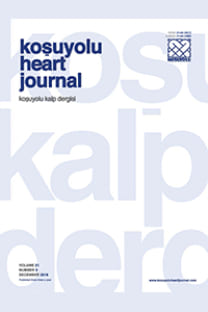Prognostic Impact of Modified Glasgow Prognostic Score in Patients with Heart Failure with Mildly Reduced Ejection Fraction
Heart failure, ejection fraction, heart,
___
- 1. McDonagh TA, Metra M, Adamo M, Gardner RS, Baumbach A, Böhm M, et al. 2021 ESC Guidelines for the diagnosis and treatment of acute and chronic heart failure. Eur Heart J 2021;42(36):3599-726. [Crossref]
- 2. Freeman AM, Morris PB, Barnard N, Esselstyn CB, Ros E, Agatston A, et al. Trending cardiovascular nutrition controversies. J Am Coll Cardiol 2017;69(9):1172-87. [Crossref]
- 3. Vasan RS, Sullivan LM, Roubenoff R, Dinarello CA, Harris T, Benjamin EJ, et al. Inflammatory markers and risk of heart failure in elderly subjects without prior myocardial infarction: the Framingham heart study. Circulation 2003;107(11):1486-91. [Crossref]
- 4. Cho A, Arfsten H, Goliasch G, Bartko PE, Wurm R, Strunk G, et al. The inflammation-based modified Glasgow prognostic score is associated with survival in stable heart failure patients. ESC Heart Fail 2020;7(2):654-62. [Crossref]
- 5. Sze S, Pellicori P, Zhang J, Clark AL. Malnutrition, congestion, and mortality in ambulatory patients with heart failure. Heart 2019;105:297-306. [Crossref]
- 6. McMillan DC. The systemic inflammation-based Glasgow Prognostic Score: a decade of experience in patients with cancer. Cancer Treat Rev 2013;39:534-40. [Crossref]
- 7. Bolat I, Biteker M. Modified Glasgow prognostic score is a novel predictor of clinical outcome in heart failure with preserved ejection fraction. Scand Cardiovasc J 2020;22:1-5. [Crossref]
- 8. Namiuchi S, Sugie T, Saji K, Takii T, Suda A, Kato A. The systemic inflammation-based Glasgow prognostic score as a prognostic factor in patients with acute heart failure. J Cardiovasc Med (Hagerstown) 2015;16(6):409-15. [Crossref]
- 9. Altay S, Gürdoğan M, Keskin M, Kardaş F, Çakır B. The inflammation-based glasgow prognostic score as a prognostic factor in patients with intensive cardiovascular care unit. Medicina (Kaunas) 2019;55(5):139. [Crossref]
- 10. Seta Y, Shan K, Bozkurt B, Oral H, Mann DL. Basic mechanisms in heart failure: the cytokine hypothesis. J Card Fail 1996;2(3):243-9. [Crossref]
- 11. Dick SA, Epelman S. Chronic heart failure and inflammation: what do we really know? Circ Res 2016;119:159-76. [Crossref]
- 12. Kaya Z, Leib C, Katus HA. Autoantibodies in heart failure and cardiac dysfunction. Circ Res 2012;110:145-58. [Crossref]
- 13. Heymans S, Hirsch E, Anker SD, Aukrust P, Balligand JL, Cohen-Tervaert JW, et al. Inflammation as a therapeutic target in heart failure? A scientific statement from the Translational Research Committee of the Heart Failure Association of the European Society of Cardiology. Eur J Heart Fail 2009;11(2):119-29. [Crossref]
- 14. Van Linthout S, Tschope C. Inflammation-cause or consequence of heart failure or both? Curr Heart Fail Rep 2017;14:251-65. [Crossref]
- 15. Lourenço P, Silva S, Friões F, Alvelos M, Amorim M, Couto M, et al. Low prealbumin is strongly associated with adverse outcome in heart failure. Heart 2014;100(22):1780-5. [Crossref]
- 16. Ignacio de Ulíbarri J, González-Madroño A, de Villar NG, González P, González B, Mancha A, et al. CONUT: a tool for controlling nutritional status. First validation in a hospital population. Nutr Hosp 2005;20(1):38-45.
- 17. Lin H, Zhang H, Lin Z, Li X, Kong X, Sun G. Review of nutritional screening and assessment tools and clinical outcomes in heart failure. Heart Fail Rev 2016;21(5):549-65. [Crossref]
- 18. Rastogi A, Novak E, Platts AE, Mann DL. Epidemiology, pathophysiology and clinical outcomes for heart failure patients with a mid-range ejection fraction. Eur J Heart Fail 2017;19(12):1597-605. [Crossref]
- 19. Kalogeropoulos AP, Fonarow GC, Georgiopoulou V, Burkman G, Siwamogsatham S, Patel A, et al. Characteristics and outcomes of adult outpatients with heart failure and improved or recovered ejection fraction. JAMA Cardiol 2016;1(5):510-8. [Crossref]
- 20. Triposkiadis F, Butler J, Abboud FM, Armstrong PW, Adamopoulos S, Atherton JJ, et al. The continuous heart failure spectrum: moving beyond an ejection fraction classification. Eur Heart J 2019;40(26):2155-63. [Crossref]
- 21. Hsu JJ, Ziaeian B, Fonarow GC. Heart failure with mid-range (borderline) ejection fraction: clinical implications and future directions. JACC Heart Fail 2017;5:763-71. [Crossref]
- 22. Lopatin Y. Heart failure with mid-range ejection fraction and how to treat it. Card Fail Rev 2018;4(1):9-13. [Crossref]
- 23. Bhambhani V, Kizer JR, Lima JAC, van der Harst P, Bahrami H, Nayor M, et al. Predictors and outcomes of heart failure with mid-range ejection fraction. Eur J Heart Fail 2018;20(4):651-9. [Crossref]
- 24. Chioncel O, Lainscak M, Seferovic PM, Anker SD, Crespo-Leiro MG, Harjola VP, et al. Epidemiology and one-year outcomes in patients with chronic heart failure and preserved, mid-range and reduced ejection fraction: an analysis of the ESC Heart Failure Long-Term Registry. Eur J Heart Fail 2017;19(12):1574-85. [Crossref]
- ISSN: 2149-2972
- Yayın Aralığı: Yılda 3 Sayı
- Başlangıç: 1990
- Yayıncı: Sağlık Bilimleri Üniversitesi, Kartal Koşuyolu Yüksek İhtisas Eğitim ve Araştırma Hastanesi
Yeşim Uygun Kızmaz, Şeyhmus Külahçıoğlu, Hacer Ceren Tokgöz, Özgür Yaşar Akbal, Ali Karagöz
Can Özkan, Emrullah Kızıltunç, Velihan Çayhan, İlyas Emre Yakıcı, Mustafa Çetin, Ahmet Korkmaz, Birsen Doğanay, Ender Örnek
Mehmet Erdem Toker, Cüneyt Arkan, Ahmet Erdal Taşçı, Erdal Polat, Üzeyir Yılmaz, Tunahan Sarı, Ömer Faruk Akardere
Doğaç Okşen, Mert Sarılar, Gürsu Demirci, İsmail Haberal, Okay Abacı
Arif Selçuk, Mehmet Emir Erol, Sertan Özyalçın
Veysel Başa, Fatih Yiğit, Fariz Jafarov, Hasan Sunar
Mehmet Fatih Yılmaz, Sedat Kalkan
Faysal Şaylık, Tufan Çınar, Murat Selçuk, Tayyar Akbulut
Kadriye Memiç Sanca, Serkan Kahraman, Seda Tükenmez Karakurt, Meltem Tekin, Büşra Çörekcioğlu, Alkım Ateşli, Hulusi Satılmışoğlu, Gökhan Demirci, Mustafa Yıldız
Ahmet Güler, Aslan Erdoğan, Ender Özgün Çakmak, Alev Kılıçgedik, Cevat Kırma
